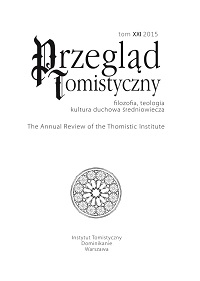„Skutecznościowy” i „relacyjny” aspekt odżywania sakramentów
The “Efficacial” and “Relational” Aspect of the Reviviscence of the Sacraments
Author(s): Michał GolubiewskiSubject(s): Christian Theology and Religion
Published by: Instytut Tomistyczny
Keywords: Sacramentology; reviviscence of the sacraments; baptism; relation; sonship; sakramentologia; odżywanie sakramentów; chrzest; relacja; synostwo
Summary/Abstract: The reviviscence of a sacrament denotes a situation when a valid but unfruitful sacrament becomes fruitful (confers grace) after some time. The classic understanding of the reviviscence of sacraments was focused on the question of their “efficacy,” that is, on the question how a sacrament in this atypical situation attains its main effect (that is, confers grace). This understanding was crystallized particularly during discussions about the type of causality at work in the sacraments (instrumental effi cient perfective causality, moral or dispositive, intentional or symbolic, for example). The truth about the interpersonal character of the sacraments as an expression of God’s love for man received relatively little attention in this approach. In the twentieth century, there was a “personalist turn” in sacramentology that enabled a new look at the reviviscence of the sacraments. At the same time, this “turn” meant questioning some elements of classic sacramentology, and especially the metaphysics it involved. This article proposes a renewed conception of the reviviscence of the sacraments. Using the reviviscence of baptism as the point of departure, it underlines the interpersonal and relational dimension of the sacraments without losing reference to more classic conceptions. It presents the reviviscence of baptism in light of the parable of the merciful father and his two sons (Lk 15:11–32). According to the “sacramental” interpretation of this parable proposed in the text, the older son represents somebody who has received baptism in a valid way (so that he has become, in a way, a member of the family – the Church) but without fruit of grace (meaning that he does not live his sonship fully). This interpretation is further deepened using some notions of the philosophical theory of relation and its psychological theories. The reviviscence of baptism shown in this perspective is a passage from a less perfect relationship of sonship (between man and God) initiated by the valid sacrament and the character it has imprinted to a more perfect relation of sonship (founded by grace) in the fruitful sacrament.
Journal: Przegląd Tomistyczny
- Issue Year: 2015
- Issue No: XXI
- Page Range: 491-506
- Page Count: 16
- Language: Polish

